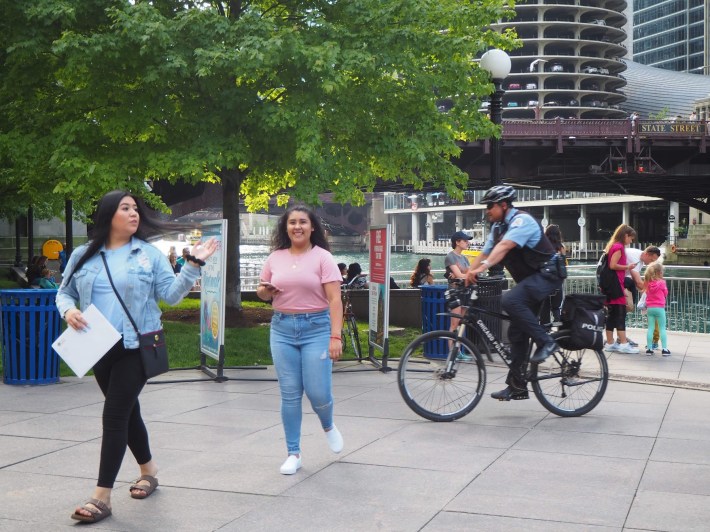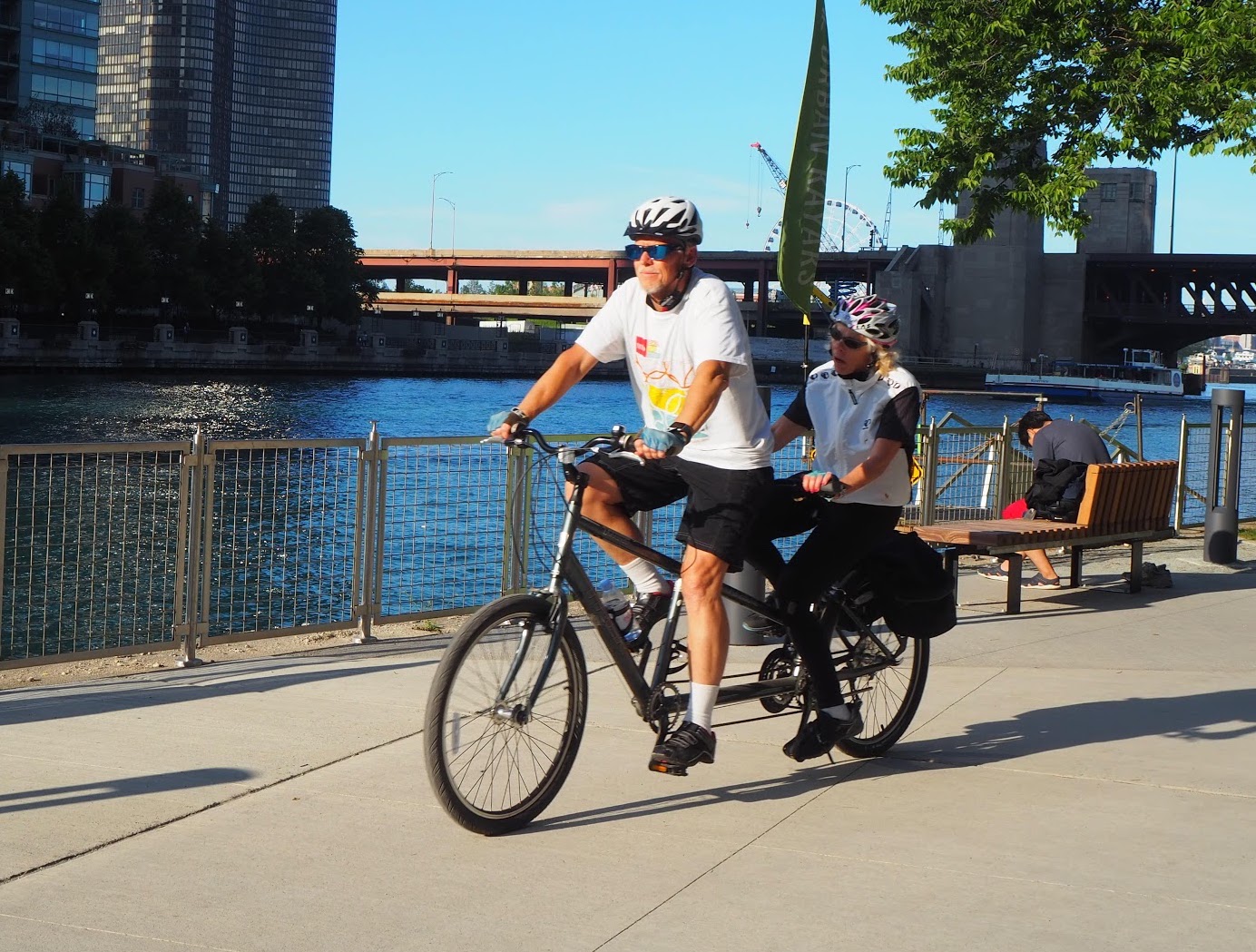[This article originally ran in the Chicago Reader. This version has additional quotes from city emails that got left on the cutting-room floor due to word count limitations.]
If I’d known city officials were going to try to ban bicycling on the new Chicago Riverwalk, I never would have helped rally support for building it. From the start, the riverwalk extension, which expanded the promenade west of half a mile west of State to Lake and Wacker, was promoted to the public as a useful commuting corridor for cyclists and pedestrians, not just a place to wander aimlessly or lounge with a glass of cabernet.
The city’s pitch to the federal government for a $99 million Transportation (emphasis added) Infrastructure Finance Innovation Act loan to build the esplanade promised, “The project will enhance safety… with bicycle paths and pedestrian trails along the continuous promenade.”
And at a 2013 public hearing on the project, city planner Michelle Woods said she expected that bike commuters would use the promenade as a safe, car-free connection between the Lakefront Trail and the Loop, “which frankly I am fine with them doing.” Assurances like this were a big reason why I wrote half a dozen Streetsblog posts cheerleading the project, which probably helped grease the wheels a bit for making then-mayor Rahm Emanuel’s riverwalk dream a reality.
Fast-forward a few years to the summer 2018, by which time the promenade had become something of a victim of its own success. At peak times during the warmer months, the café zone between State and Clark Street was a lively, but chaotic mix of uses, including families strolling with young kids, seniors walking dogs, fisher-folk, boaters pulling up to the dock, and lots of young professionals sipping craft beer.
I’d be the first to admit you’d have to be nuts to bike at full speed through that mass of humanity. Dismounting, or at least riding at walking speed, are the only safe and non-obnoxious options.
But by early September the city had posted signs implying that cycling isn’t permitted on the path at all. “Share the Riverwalk: Walk Your Bike,” they exhorted. I responded with a blog post pointing out that the signs were bogus because the promenade was funded as a bike/ped facility, and it was still designated as an off-street trail on the city’s official bike map.
In late September, clout-heavy downtown alderman Brendan Reilly introduced an ordinance to officially ban cycling on the riverwalk 24/7. While Reilly had signed off on several protected bicycle lanes in his ward in the past, he also had a history of anti-bike activity, like using aldermanic privilege to block the installation of Divvy stations on the Magnificent Mile, helping to get pedicabs banned from downtown streets, and closing an entrance to the Lakefront Trail at night.
After I posted on Twitter about Reilly’s bike ban plan, he tweeted a taunting response. “Full credit goes to Streetsblog for pointing out there was no ordinance to support the ‘Walk your bike’ signs. As such, we introduced an ordinance to do just that.”
Soon after that, new signs were posted at all the riverwalk entrances stating, among other rules, “Bicycles Must Be Walked” and threatening “Violators Will Be Prosecuted,” even though cycling was still legal.
Earlier this year the city did a makeover of the older section of the riverwalk east of Michigan Avenue, adding new trees, bathrooms, seating, public art, and a WWII submarine memorial. When I first biked on it in mid-May, I was also highly annoyed to see that the straight asphalt path that previously existed had been replaced with a zigzagging concrete one with multiple bottlenecks, that seemed purposely designed to discourage cycling.
The City Clerk’s office confirmed that Reilly’s ordinance still hadn’t passed, but on that ride four different security guards, following orders from supervisors, flagged me down to erroneously tell me it was illegal to bike on the riverwalk.
I wrote about that experience on Streetsblog, quoting Active Transportation Alliance director Ron Burke, who agreed that “security guards currently have no authority to block cycling on the riverwalk.” He blasted the Chicago Department of Fleet and Facility Management (F2M), which oversees the promenade, for “the disregard they demonstrated towards cycling with their redesign,” noting that Active Trans had been given no opportunity to provide input on the plan.

Emails I obtained from the department via a public records request show that my riverwalk piece made some waves. “Did you see this blog post?” asked Holly Agra, the CEO of the tour company Chicago’s First Lady Cruises in a May 16 email to Michelle Woods, now working as a project manager at F2M. “Should I ask Alderman Reilly to revisit his plan?”
Woods forwarded the message to Reilly’s assistant Robert Kearney. “Let me know if your office gets feedback on this.”
The same day Burke wrote Woods and her boss F2M commissioner David Reynolds, asking if the city was still moving forward with the bike ban. “The new bike-unfriendly [east riverwalk] design seems to reflect anti-bike intentions as well. All of this threatens Chicago’s ability to grow cycling and connect the Lakefront Trail to a future Chicago River Trail.” He offered to work with them on a compromise.
Later that day Woods sent Reynolds previous correspondence between a Chicago Department of Transportation engineer Oswaldo Chaves and local Federal Highway Administration staffer Michael Kowalczyk. It was an inconclusive conversation on whether Chicago could get away with banning cycling on the riverwalk, despite the fact that the city had gotten the $99 million TIFIA loan partly based on the promise that the esplanade would serve as a bike commuting corridor.
On May 20, the day of Lori Lightfoot’s inauguration, Burke followed up with Woods and Reynolds asking if the total bike ban could be replaced with time of year / time of day restrictions and/or “Walk Your Bike When Congested” signs. There was a note of urgency in his message. “Emotions are high in the cycling community over this,” he wrote. “Some sort of protest on the riverwalk and/or Upper Wacker is a possibility, and I think we can head this off with a reasonable compromise.”
Commissioner Reynolds then wrote his deputy Ivan Hansen, “[Active Trans] is getting ready to protest the riverwalk… I would like to work with them.” He told Hansen to have the security guards stop confronting cyclists before 9 a.m.
That explains why, the next time I cycled on the riverwalk on a sunny afternoon, when a guard flagged me down, she told me biking was only permitted during the morning rush. At the time I was cheekily wearing a t-shirt I’d Sharpied with the text “Hi there! Despite what the signs say, Alderman Reilly’s ordinance to ban biking on the riverwalk (O2018-7034) never passed, so it’s still legal. Thank you!”
F2M continued to negotiate with Active Trans, offering to involve them in a CDOT study of cyclist and pedestrian interactions on the promenade. Meanwhile the advocacy group announced that it was in talks with Reilly, CDOT, riverwalk designer Ross Barney Architects, and various downtown groups bout the possibility of converting one or more lanes of Upper Wacker to protected bike lanes.
In a May 22 email to Michelle Woods and CDOT staff, Burke again urged them to try a “Walk Bikes in Congested Areas, Ride Slowly All Other Times” approach. “It’s important to identify the underlying cause of this problem,” he noted. “Cars take up ¾ of the public right of way… which forces people walking and biking to fight over the remaining scraps – this is an example of that. No one is telling motorists to walk their cars amid the sea of pedestrians downtown.”
After I tweeted out a photo of my Reilly-trolling t-shirt, the alderman responded “Thanks for the reminder - I’ll be sure to pass the ordinance this summer.” True to his word, he reintroduced the bike ban legislation to City Council on May 5/29.
However, in early June, CDOT spokesman Mike Claffey told Chicago Magazine that the official city policy currently allows cycling on the path “when the riverwalk is not congested.” Since then, I’ve heard multiple reports that the guards are no longer scolding cyclists, although, as of last week, the threatening signs were still posted at the riverwalk entrances.
Of course, the current détente will end if Reilly gets his way. That seems like a long shot: Cyclists will likely show up in force to testify against the ordinance if the Committee of Pedestrian and Traffic Safety ever holds a hearing on it, and an alderman on the committee told me they plan to fight the legislation.
But in the unlikely event that the ordinance passes, I’ve already announced on twitter that I’ll respond to the unjust law with civil disobedience. As I’ve previously discussed in the Reader, I was the first person to be jailed for riding in Chicago’s monthly Critical Mass ride. So I might as well take one for the team by getting arrested for biking on a bikeway.





